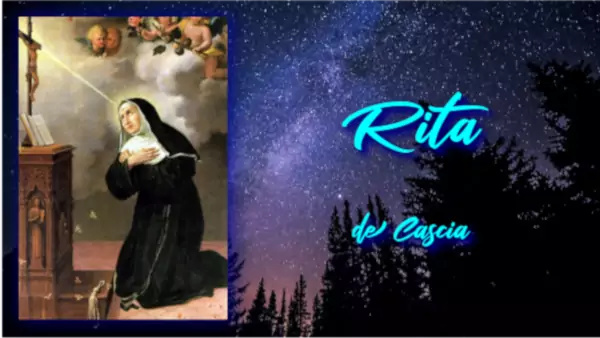22 May - Margherita Manchini, commonly known as Sister Rita of Cascia commonly simplified into Rita, born in May 1381 in Roccaporena (Umbria, Italy) is the only daughter of Antonio Manchini and Amata Ferri. Little is known about Rita's parents, except that they were nicknamed "the peace-bearers of Jesus Christ".
They acted as mediators between clans and families, trying to make people forget the demands of the vendetta. Rita did not forget this example. From the age of 16, she had thought about religious life, but her parents had decided otherwise. They had arranged for her to marry a rich and noble young man from the country, Paul Mancini. Although she had begged them to let her enter the convent, she had to marry him in 1399 and became the mother of twins, Jacques-Antoine and Paul-Marie. Paul was quick to get carried away, and although he had apparently mellowed since the birth of his children, he had made enemies in the region. One night, in 1412, he was murdered. There are accounts of an ambush, and others of a quarrel that he had provoked and in which he was killed.
Rita continued to devote herself to her children, but it became clear to her that they were determined to avenge their father's death. She tried to dissuade them from doing so and to make them understand that it would be murder. She prayed that they would give up their plans. Her two sons died of natural causes, swept away by a plague epidemic, after begging their mother's forgiveness.
In 1420, finding herself alone, Rita wanted to enter the Augustinian nuns at the monastery of Santa Maria Magdalena in Cascia. She was turned away, because the constitutions of the order forbade the acceptance of widows. Moreover, her husband's family and that of her murderer had not been reconciled. The monastery was afraid of reprisals. But she insisted, and was finally admitted on one condition: she had to reconcile her family with her husband's murderers. She pursued this goal, which proved to be difficult. When the two clans granted each other a pardon in front of the Bishop of Cascia (she was then 36 years old), she was allowed to enter the monastery where she remained until her death in 1457.
As a nun, Rita tried to live to the end the demands of her state: life of prayer, obedience, poverty and penance. Following a sermon on the passion of St. James of the March, she asked God to make her share, in her flesh, in the sufferings of Christ. She would have been answered and a thorn from the crown of Christ before whom she was praying would have been detached to come and fix itself on her forehead. This is why she is depicted with an incurable wound on her forehead. Stigmatized by this mark, she endured the ordeal she had asked for.
She was at the service of the poorest people of Cascia, who benefited from the quality of her charity. She went to Rome in 1450 for the jubilee or golden year that the Pope had decided to celebrate in order to thank God for having liberated the country from all wars. At the age of 69, she travelled with some Sisters the 180 kilometres that separated them from the centre of Christianity.
On her deathbed, Rita asked her cousin to go and pick a rose for her. Although in the middle of winter, the relative finds the rose; this episode is at the origin of the many representations of the saint spreading roses, symbol of the graces she obtains for those who trust in her intercession. She died on May 22, 1457, at the age of 76. From the day of her death, the people of Cascia proclaimed this little handmaid of the Lord a saint, long before the Catholic Church recognized her as such. The people of Cascia had witnessed miracles and inexplicable wonders.
She was beatified in 1628 by Pope Urban VIII, and it is to the latter's private secretary, Cardinal Fausto Poli, born about fifteen kilometres from Cascia, that we owe the development of her cult, authorised by the Holy See from 1672 onwards. Pope Leo XIII canonised her on 24 May 1900.








